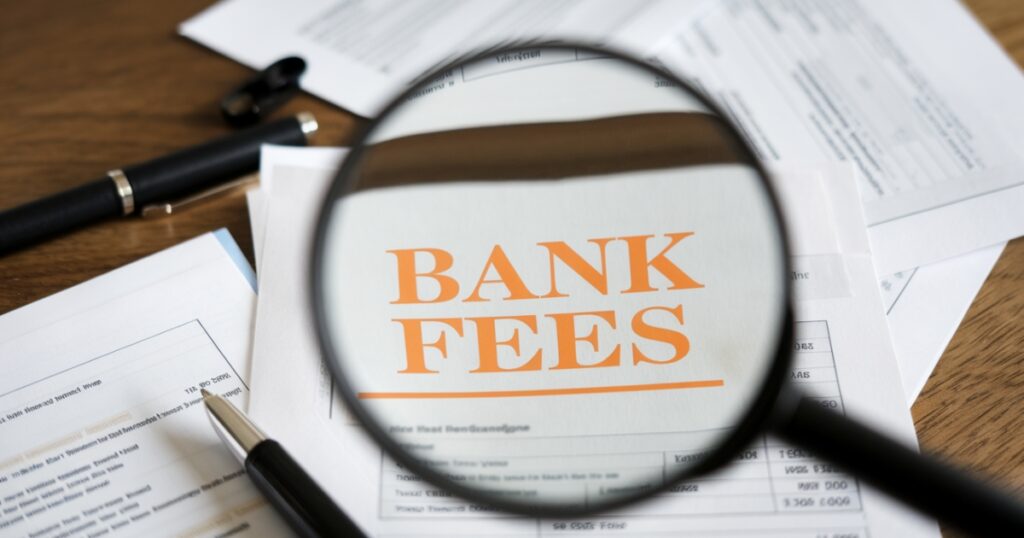
Bank fees can add up quickly, cutting into your hard-earned money with charges for transactions, ATM withdrawals, and account management. Understanding how these fees are structured and why banks impose them is the first step to avoiding unnecessary costs. Whether you are a seasoned saver or just beginning to manage your finances, learning how to navigate these fees can result in substantial savings. Are you ready to discover strategies that can help you keep more of your money?
Key Takeaways
- Understand Fees: Recognising the different types of fees, such as ATM and overdraft charges, is crucial for managing and avoiding them.
- Adopt Savings Strategies: Use in-network ATMs, reduce transaction frequency, and maintain minimum balances to minimise fees.
- Negotiate and Compare: Look for better deals and negotiate fee waivers, especially if you have a long-standing relationship with your bank.
About Arcadia Finance
With Arcadia Finance, securing your loan is simple and stress-free. Benefit from no application fees and access 19 trusted lenders, each fully regulated by South Africa’s National Credit Regulator. Experience a smooth process with personalized options designed for your financial requirements.
What Are Bank Fees?
Bank fees include various charges imposed by financial institutions on personal and business accounts, covering activities from account setup to regular maintenance and specific transactions. These fees can be one-time costs or recurring charges. Common types of bank fees include account maintenance charges, fees for withdrawals and transfers, ATM usage fees, penalties for insufficient funds (NSF), and late payment fees.
Avoid unnecessary charges by banking smarter. Check out the best banks in South Africa according to survey to see which institutions deliver excellent service without hefty fees.

Bank Fees in South Africa
In South Africa, banks charge for the services they provide to both personal and business clients. Fees can apply simply for maintaining certain types of deposit accounts. Transaction fees or penalties for insufficient funds, such as those from bounced cheques, are also common. While some fees are standard, others may be waived under specific conditions. For example, clients with long-term relationships and multiple accounts or loans with a bank may be eligible for fee waivers.
All financial institutions in South Africa are required to be transparent about their fee structures. Detailed fee schedules are available on banks’ websites and in brochures. Customers should carefully review these disclosures to avoid unexpected costs. The competitive banking environment naturally regulates fees, but bodies like the South African Reserve Bank (SARB) and the National Consumer Commission (NCC) are also available to address complaints about fee practices.
Financial institutions must provide clear, written disclosures of their fees, and customers are encouraged to review all details. Fees are typically listed on paper bank statements, passbooks, and online banking portals. Generally, transaction-related fees are applied at the time of the transaction, while account maintenance fees are added at the end of the month.
In South Africa, while most of a financial institution’s revenue comes from net interest income, a significant portion also comes from bank fees. Although these fees may seem small individually, they add up and contribute significantly to a bank’s earnings. In periods of low interest rates, which reduce net interest margins, bank fees become an important source of financial stability for banks.
One of the ways to prevent unnecessary fees is by being proactive. In cases of theft or fraud, blocking a credit card immediately can save you from hefty charges that add to your financial burden.
How to Apply for a Loan with Arcadia Finance
Applying for a loan with Arcadia Finance is simple and easy. Begin your application on our website, where our friendly and experienced team is ready to assist with any questions. Provide us with basic information, such as your income, expenses, desired loan amount, and repayment term. Once submitted, our team will quickly review your application and get back to you with a decision.
What are the Different Types of Bank Fees?
Fees for Withdrawing Money from an ATM
When you withdraw cash from an ATM, most banks charge a fee. These fees can vary significantly depending on your bank and the type of account you hold, typically ranging from R10 to R20 for withdrawals from ATMs not affiliated with your bank.
How to avoid this fee: Plan your cash withdrawals ahead of time, use ATMs affiliated with your bank, and consider withdrawing larger amounts less frequently. Many banks also offer accounts that include a certain number of free ATM transactions per month.
Charges for Overdraft or Insufficient Funds
Fees for overdrafts or insufficient funds are charged when you spend more than what is available in your bank account. These fees typically range from R50 to R200 per transaction.
How to avoid this fee: Set up account alerts to monitor your balance, maintain a buffer in your account, or establish a linked savings account that automatically covers overdrafts, often at a lower cost. Some banks offer overdraft protection plans, which, although they may involve fees or interest, are generally more cost-effective than repeated overdraft fees.
Monthly Account Maintenance Fees
Monthly account maintenance fees are charged to cover the operational costs of managing your bank account, usually between R50 and R100 per month.
How to avoid this fee: Look for bank accounts that waive these fees under certain conditions, such as maintaining a minimum balance or receiving a monthly deposit above a certain amount. Comparing different banks’ accounts may reveal options with lower or no monthly fees.
Fees for Checking Account Balances at an ATM
Some banks charge a fee for checking your account balance at an ATM, typically ranging from R1 to R5 per inquiry.
How to avoid this fee: Use online banking or mobile apps to check your account balance for free. Many banks offer unlimited free inquiries through these digital channels, which can save you money over time.
Charges for Setting Up Debit Orders
Setting up debit orders for automated payments can incur fees, usually ranging from R3 to R10 per setup.
How to avoid this fee: Some banks offer account packages that include a certain number of free debit orders. Opt for these packages if you frequently use debit orders, and consolidate smaller bills into one payment if possible to reduce the total number of debit orders.
Fees for Depositing Money at an ATM or Teller
Depositing cash or cheques at an ATM or through a bank teller can incur fees from R5 to R30 per transaction.
How to avoid this fee: Many banks provide a number of free deposits each month. Plan your deposits to stay within these limits, and use direct deposit or electronic transfers for transactions when possible, as these methods often have lower fees.
Charges for Making Online Payments
Fees for online payments, such as transfers or bill payments, can vary from R1 to R10 per transaction.
How to avoid this fee: Choose a banking package that includes free unlimited online transactions, especially if you frequently manage your finances online. Scheduling payments for non-peak times can also sometimes result in lower fees, as some banks offer reduced charges for transactions made during off-hours.
Top Tip: Compare various banks and their offerings to ensure you select the most suitable account for your needs.
Considering a switch to a more cost-effective banking solution? Learn how easy it is to open a bank account with competitive fee structures and start saving today.

Strategies to Avoid Bank Fees
Bank fees can erode your savings if not managed wisely. Here are some effective strategies to minimise or avoid these fees, keeping more money in your pocket.
| Strategy | Description |
|---|---|
| Choose the Right Bank Account | Investigate and choose a bank account that matches your financial habits. Assess accounts based on your usual transaction frequency, average balance, and required services. Comparing fees and benefits across different banks can help you find the most cost-effective option tailored to your needs. |
| Utilise Digital Banking | Take advantage of online and mobile banking to minimise or avoid fees associated with traditional branch transactions. Digital platforms often offer fee waivers for transfers, statements, and account management tasks. They also provide tools for improved financial tracking and budgeting. |
| Plan Your Cash Withdrawals | Minimise ATM fees by planning your cash withdrawals strategically. Use ATMs within your bank’s network to avoid extra charges, and consider withdrawing larger amounts less frequently. Alternatively, take advantage of cashback options available at many retailers, which do not incur ATM fees. |
| Monitor Your Account Regularly | Use your bank’s alert systems to monitor your account activity closely. Setting up notifications for low balances and large transactions can help you manage your funds more effectively, avoid overdraft fees, and meet any minimum balance requirements. |
| Negotiate with Your Bank | Use your loyalty and banking history as leverage to negotiate lower fees or better account terms. Discuss the possibility of fee reductions or waivers with your bank, particularly if you have been a long-standing customer or hold multiple accounts or services with them. |
Additional Tips
- Consider consolidating multiple bank accounts if possible to avoid paying fees on each.
- Look for accounts with low or no monthly maintenance fees, especially those that offer fee waivers based on minimum balance or deposit conditions.
- Negotiate with your bank for better terms once you have established a solid banking relationship or if you hold multiple products with them.
- Set up alerts for low balances and large transactions to manage your account more effectively and avoid overdraft fees.
- Use digital payment methods and direct deposits to reduce transaction fees and streamline your financial management.
Conclusion
Financial institutions impose charges for various services, including overdraft, ATM, monthly maintenance, wire transfers, and foreign transactions. To avoid these costs, monitor your account balance closely, use ATMs within your bank’s network, maintain minimum balances, opt for electronic statements, explore alternative payment options, and review the fee structures of different banks.
Frequently Asked Questions
The most common bank fees include charges for ATM withdrawals, account maintenance, overdrafts, and transactions that exceed available funds. Fees can vary significantly between banks and account types.
Banks charge fees to cover the administrative costs of managing accounts and processing transactions. These fees also contribute to the bank’s revenue, especially during periods of low interest rates.
To avoid ATM fees, use ATMs within your bank’s network. Additionally, consider making fewer, larger withdrawals to reduce the frequency of fees or use cashback options during retail transactions.
Many banks offer ways to reduce or waive maintenance fees, such as maintaining a minimum balance, using direct deposits, or linking to other bank products. Check your bank’s policy or negotiate terms based on your banking relationship.
When comparing banks, examine the fee structures for different services and choose a bank that offers lower or no fees for the services you use most. Also, consider banks that offer fee waivers or benefits for consolidating accounts and services.
Fast, uncomplicated, and trustworthy loan comparisons
At Arcadia Finance, you can compare loan offers from multiple lenders with no obligation and free of charge. Get a clear overview of your options and choose the best deal for you.
Fill out our form today to easily compare interest rates from 19 banks and find the right loan for you.


